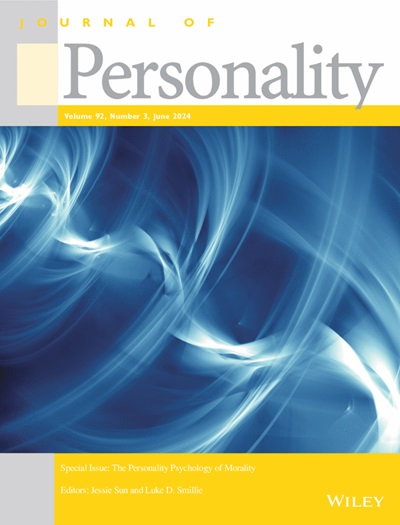Does Perfectionism Affect Parental Identity Development? A One‐Year Longitudinal Study
IF 2.7
1区 心理学
Q1 Psychology
引用次数: 0
Abstract
IntroductionPrevious studies have revealed that perfectionism and identity development during adolescence are related. However, no longitudinal study has been conducted on the impact of perfectionism on identity development in adulthood. In the present study, we analyzed for the first time the longitudinal relationship between personal standards, an indicator of perfectionistic strivings, and concern over mistakes and doubts about actions, indicators of perfectionist concerns, and identity development in one of the most important yet least understood domains for adults, parental identity.MethodsThis 1‐year, three‐wave longitudinal study investigated reciprocal relationships between perfectionism and parental identity among 1275 parents (aged 18–30,完美主义影响父母身份发展吗?为期一年的纵向研究
先前的研究表明,青春期的完美主义和身份发展是相关的。然而,尚无关于完美主义对成年期身份发展影响的纵向研究。在本研究中,我们首次分析了个人标准(完美主义奋斗的指标)与对错误的担忧和对行为的怀疑(完美主义关注的指标)之间的纵向关系,以及成年人最重要但最不为人知的领域之一——父母身份的认同发展。方法对1275名18-30岁的父母(M = 26.11;Sd = 3.00)。我们使用交叉滞后面板模型分析和随机截距交叉滞后面板模型分析来分析结果。结果发现,个人标准与寻求父母身份深层信息的相对增加有关,而怀疑/担忧与失望和父母身份后悔的相对增加有关。在人际层面上,父母身份与完美主义的变化没有相互关系。然而,我们观察到父母身份在个人水平上对个人标准降低的影响。结论完美主义与父母身份认同在人际和人内层面上存在相互关系。
本文章由计算机程序翻译,如有差异,请以英文原文为准。
求助全文
约1分钟内获得全文
求助全文
来源期刊

Journal of Personality
PSYCHOLOGY, SOCIAL-
CiteScore
9.60
自引率
6.00%
发文量
100
期刊介绍:
Journal of Personality publishes scientific investigations in the field of personality. It focuses particularly on personality and behavior dynamics, personality development, and individual differences in the cognitive, affective, and interpersonal domains. The journal reflects and stimulates interest in the growth of new theoretical and methodological approaches in personality psychology.
 求助内容:
求助内容: 应助结果提醒方式:
应助结果提醒方式:


